Posts Tagged ‘Social Media’
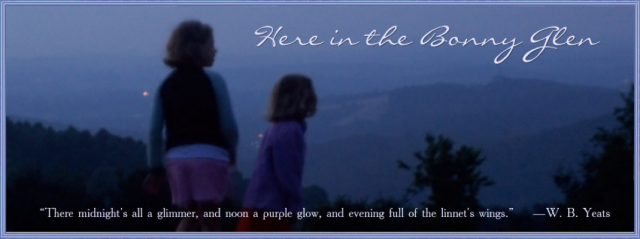
I’ve been online since April, 1995. Quit my job at HarperCollins, bought a modem, unwrapped one of those AOL starter disks that were ubiquitous in the middle of that decade, created an account—screen name LissaNY—and I was off and running. After my free trial ran out, I think we had something like five hours of dialup a week? Ten, twelve at most? Does that sound right? Whatever the cheapest package was.
Not long after that, Scott’s company (DC Comics, subsidiary of Time Warner, which bought AOL) gave all employees a free AOL account with unlimited minutes. His screen name was StratNY, in honor of his Stratocaster. I spent a lot of time on that account, reading the pregnancy and new baby boards, waiting for Jane to arrive. She was two weeks late. By the time she was born, I had a network of invisible friends—many of whom are still friends to this very day. One by one, we delivered our babies and moved to the Baby’s Here, Now What? board. After a while, we jumped to a listserv—this big group of us who’d had babies within a four- or five-month window. Nineteen years later, more than a dozen of those women are still chatting via email every single day. On Facebook, too, but mostly on the list. We’ve met in person, in various configurations, numerous times. Our babies are in college now.
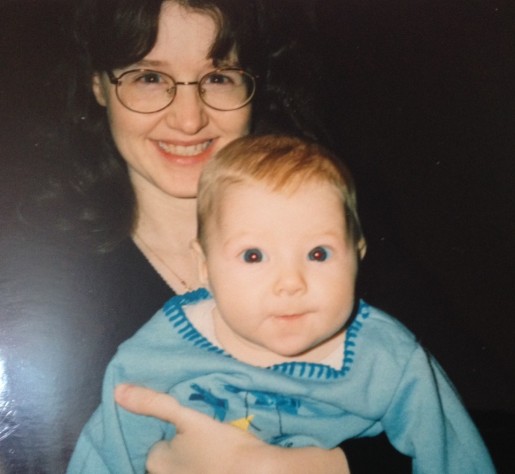
There was a big schism on the listserv around the time Jane was 18 months old. A lot of women left, and I’ve lost track of most of them. I still remember things they wrote, though, back in those days. I remember the names of their kids. When Jane was diagnosed with leukemia at 21 months, a big group of the women who’d left our original list joined forces to send us a giant box of treats from Zabar’s. Several friends from the original list visited me in the hospital, traveling from New Jersey, Boston, and even Chicago. Another woman we knew on AOL, though I don’t think she was part of the listserv, died of complications after childbirth, so horrifying, and we all made squares for a quilt for the baby. I guess that would have been before the schism, because I remember one of the departees, a New Yorker, being interviewed on the TV news about the group effort for the quilt. They shot footage of her sitting at her computer, typing a post to our group. It was such a novelty then, newsworthy, all these strangers behaving like friends. I’m not sure the reporter was convinced we actually were friends.
We are, though.
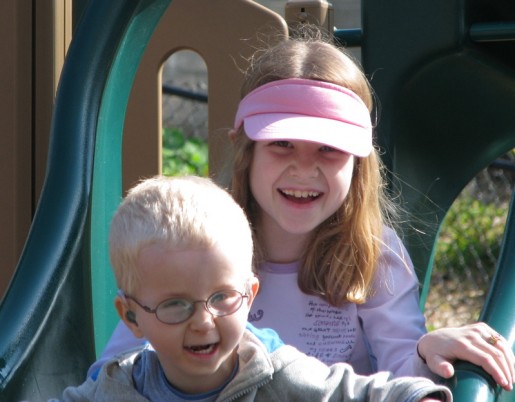
Somewhere in my first few months of being online, I began poking around the education boards. People were already asking us where we planned to send the baby to school. School? I was still trying to master the art of burping her. I flailed around a bit, reading about private vs private and whatnot, and then suddenly I discovered the homeschooling boards and our lives were never to be the same. Home Education Magazine was active on the AOL hs’ing boards back then—moderated them or something like that—and I remember Helen Hegener being a presence. And Sandra Dodd, whose kids were pretty young at the time, but she was already speaking with conviction and wisdom. Pam Sarooshian was another voice who stuck out. I seldom chimed in, I was mostly reading while nursing my infant, but boy howdy was I taking notes, mental and otherwise. I subscribed to Growing Without Schooling magazine and ordered a bunch of back issues to boot. To my mind, GWS prefigures homeschooling blogs—all those parents writing in to share details about their families’ learning adventures. I always cite John Holt, John Taylor Gatto, Charlotte Mason, and Sandra Dodd as the big influences on my ideas about home education, but probably the greatest influence was GWS: reading dozens of letters by parents in the trenches about the myriad ways their kids were learning outside school. That magazine was a revelation. OH I SEE, was my overwhelming response to the first issue I read. I GET IT. THIS IS FOR US.
I made a friend on the AOL hs’ing boards, Pam, whose son had the same birthday as Jane. We were in close daily touch for years, and when Jane got sick Pam sent the most amazing gifts for the hospital. A little box of things from nature—driftwood, beeswax, beans, seeds—pieces of nature Jane could touch and smell from her bed. We still have it, all those beans and twigs intact. There was a vanilla bean, too, inside a corked tube; I remember how its lovely scent would rise above the smell of betadine and latex. Pam also made a little comb-bound, laminated book full of pictures of road signs. Her son loved street signs and she thought Jane might enjoy them too. She did, she read that book—I almost said “to pieces” except it was so well constructed it, too, is still intact.
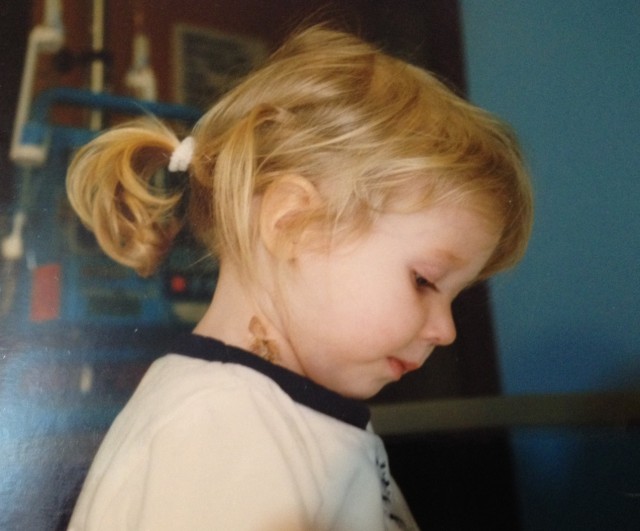
A year or so later, I found yahoogroups and joined a whole bunch of homeschooling lists. Friends I made there, too, are still with me. Like, really with me, besties. One of them became Huck’s godmother. Eventually email lists became discussion boards (and fraught with endless drama), and bit by bit some of those faded to silence as many of us migrated to blogs and, later, Facebook. Other boards are still active, and I’m the one who faded away. I moved here, to my little homestead on the internet. January will be ten years. I built my first website the summer before I started the blog, so that’s ten years ago exactly.
Blogs brought new friends. Most of you who comment regularly here are friends given to me by Bonny Glen. Sometimes I go back and reread a friend’s blog from the beginning, if the archives are public. What heady days those were! Sharing with abandon, forming blog-rings so we could hop from one to the next in a long, delightful chain. I miss blog-rings! The little “previous | next | random” links at the bottom of the page. I was crazy about that “random” feature—it was like a teleporter. Click! Here I am in someone’s kitchen! Look, she’s making a pie!
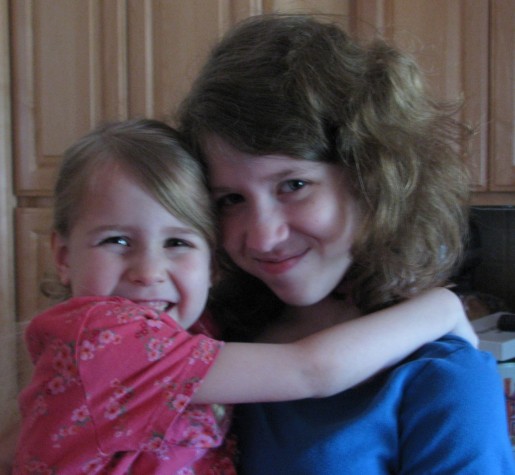
I was thinking about the early days today because I had it in my head to write a post called “Things I’ve Learned About My Online Life.” Number 1 was: BLOG FIRST. (I never got to number 2.) This struck me because I’m realizing I turned my old writing pattern upside down, and it’s got me feeling unsettled and less productive. In the early days—years—I used the blog as my transition from Mom time to Writer time. Writing about the kids (i.e., about momming) for 20 minutes helped me shift from one mode to the other. By the end of a post, I was fully in writing mode and could turn my attention to the next chapter of Martha or Charlotte. It was a pattern that worked beautifully for me, through many novels.
Now my online time is splintered between many activities—editing, researching, banking, socializing, writing, blogging, taking classes, watching compilations of 80s commercials (you know, important stuff)—and I’ve begun to feel wistful about the simpler days of yore. Olden times, when I was astonishingly productive, writing posts for not one but as many as FOUR blogs (Bonny Glen, Lilting House, daily notes, private family blog), two fat historical novels and several early readers a year, dozens of freelance articles, and thousands of words a week in discussions of homeschooling methods and philosophy. Good gravy, that was a lot of writing.

WordPress tells me I’ve published 3,081 posts here at Bonny Glen. That tally includes Lilting House, too, which I folded into this site when ClubMom shut down. I can’t begin to guess how many words that is, especially if you add in the lengthy replies I used to make in the comments. Hundreds of thousands. (ETA: Scott, doing some quick math, reckons I’ve posted upwards of two MILLION words here. Yow.) Enough for a book, several books probably. I have it in mind to collect some essays from the site for a book on tidal homeschooling at some point, a mix of new content and old posts. The trouble is, whenever I start to work on it, I find myself wanting to turn each new essay into a post instead—blogging spoils you with the instant readership, the immediate connections. Writing about tidal homeschooling without all of you chiming in in the comments feels so lonely!
And yet I’d like to persevere and make it happen. Sometimes I think the book I’d like to write isn’t about homeschooling—it’s about the online life, about these text-first connections that become real relationships. Or, well, what I’d really like is to write both books. I got my first baby and my first modem in the same month. (Practically.) I don’t know, have not experienced, motherhood separate from the internet. There’s a story there. New parents now give thought to the Google-factor when naming their babies; some parents buy domain names and lock down gmail addresses even before the child is born. That’s practical, I get it. But I realize I and some of my friends—some of —occupy this narrow, unique sliver of parenthood: the space belonging to the parents who got online first. We didn’t know (or hardly experienced) parenting without the internet. But we grew up without it, and we remember what a world-shift coming online was for us. We may have as many friends online as off. We’ve watched each other’s children grow up through the word-pictures we sketched on discussion boards and elists, the photos we pepper our social media feeds with, and—integrating words and pictures—on our blogs.
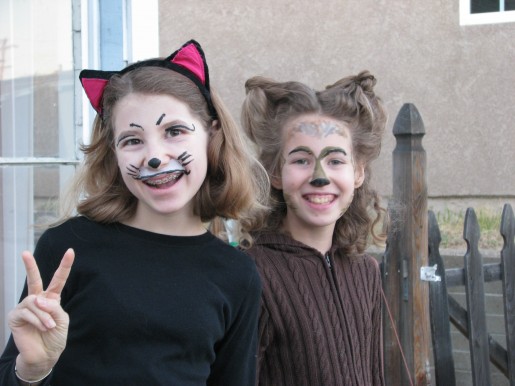
Blog first, I’m telling myself. Not with agenda, not toward any purpose other than chronicling the adventure and integrating the two dominant sides of myself. The mother, the writer. “Blogger” is such an unlovely word but it strikes me that it more than any other identifier unites those two parts of me. My blog pulls all my pieces together. It’s the home ground I return to after venturing out into new worlds. I suppose I should have thought up this post five months from now, on its tenth anniversary. But if I’ve learned anything from blogging, it’s: Write it down today, while the thought is fresh. Scheduling a topic for later turns the post into an assignment, which dramatically lowers the odds of its eventual completion. (I really am working on getting that habits post up, though!)
There! It took me all those words to figure out what I needed to know. Blog first—that’s the thought I began with. Blog fresh—that’s what my brain was trying to puzzle out. Blog lightly, in a manner of speaking—not in the sense of avoiding deep or serious topics, but without that sense of pressure and polish that rules the rest of my writing life. So now I guess I’ve gone and written a New Year’s Resolution five months early, too. Blog freehand. How funny this is—I didn’t even know I needed to give myself a talking-to!
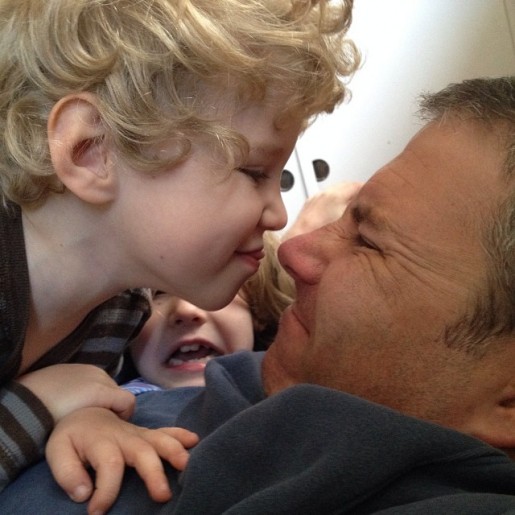
I’ve made an uneasy peace with becoming a product sold to advertisers. Now it seems I’ve been a lab rat, too.
The AV Club reports:
Scientists at Facebook have published a paper showing that they manipulated the content seen by more than 600,000 users in an attempt to determine whether this would affect their emotional state. The paper, “Experimental evidence of massive-scale emotional contagion through social networks,” was published in The Proceedings Of The National Academy Of Sciences. It shows how Facebook data scientists tweaked the algorithm that determines which posts appear on users’ news feeds—specifically, researchers skewed the number of positive or negative terms seen by randomly selected users. Facebook then analyzed the future postings of those users over the course of a week to see if people responded with increased positivity or negativity of their own, thus answering the question of whether emotional states can be transmitted across a social network. Result: They can! Which is great news for Facebook data scientists hoping to prove a point about modern psychology. It’s less great for the people having their emotions secretly manipulated.

I uploaded this picture last night, intending to write my usual sort of daily-chronicle post. Then my eye wandered from the rainbows inscribed on the bubble to the blunt, browned ends of the grass and I got distracted by the ruthlessness with which we shear off the tender edges of nature. I wandered off to bed, musing, leaving the post unwritten. (Huck’s finger is much improved, was the gist.)
This morning, after reading the article quoted above (about a different kind of bubble, a ruthlessness altogether unsurprising but disgusting nonetheless), I came back here and found the photo waiting. And now I see that I’m in the picture too, there inside the bubble, taking a photo of the green world on the other side of the film. You could work up quite a metaphor there, obvious, clumsy, but apt: the insubstantial bubbles, the world outside, the illusions of people that aren’t the persons themselves.
But my frustrations aren’t philosophical (of course Facebook was always going to exploit us in every way possible) but practical. The reason a billion people have handed over their (our) data to Facebook is, at heart, a practical one: it’s the most efficient platform anyone has yet come up with for letting us keep in touch with a large number of friends and family at once. We failed at writing letters. Good phone conversations, while satisfying, take immense chunks of time. If you want to keep up with each other’s daily lives, the little things, you have to talk every couple of days (at the least) or else there’s too much ground to cover and you must out of necessity abridge.
Yahoogroups worked, for a while—you could engage in meaningful discourse or chummy banter with a good-sized group of people at once. But generally most of those relationships were new, were forged because of the group, by means of the group. I made some lifelong friends that way (hello, TAMs! hello, Karen!) but (I don’t like that ‘but’; it sounds like a devaluation of the friendships on its left, and that isn’t what I mean at all)—but—but my high-school friends didn’t form a Yahoogroup. My college friends didn’t. We kept to our phone calls, our occasional letters and visits. I read letters six times and treasured them, and didn’t write back, or did but didn’t stop for stamps.
After a while, most of the Yahoogroups I was part of morphed into discussion boards (more efficient, because they allowed for topic-sorting; less efficient, because they required administration and management) or faded into disuse. I think I’m still signed up to forty-odd lists. I get mail from three, and read one and a half. It’s years since I logged into a discussion board.
Then came blogs. Those of us still doggedly blogging for personal reasons look back on 2005 and 2006 with nostalgia: we remember what it was like in those days, less than a decade ago, when we were for the first time opening our front doors and saying here’s my house, come in. We shared too much, made friends, celebrated art and nature, got in fights, copied one another or got furious about being copied—all the same things we’d done on AOL in 1995 and in email groups in 1999, only now with photos of our children. We formed new and very real friendships: real and strange, because we knew (know) so much about each other and have watched each other’s children grow up, and yet we live so far away some of us may never meet. When one of us goes silent for a while, the others worry. Sometimes I’ll think: if she dies, I might never know what happened.
That’s if she isn’t on Facebook. Because that’s what Facebook does better than blogging—connects wide groups of people and spreads news they wouldn’t necessarily publish on any other website—and Facebook is why only a fraction of my friends-who-blogged are blogging still. Facebook IS blogging. It’s everyone blogging at once on the same platform, a platform cleverly managed (manipulated) for purposes we all agree are greedy at best, and not guided by principles that put our best interests remotely near the top of the priority list.
I love Facebook. I hate Facebook. I have loved and hated it since the day I joined. Facebook gave me back friends I had lost: that’s the sum total of my reason for loving it, and it’s immense. All those other platforms brought me new friends. Facebook reunited me with old ones. I don’t need to dress it up in metaphors. I’d lost touch with some of the people I loved best, and Facebook gave them back to me. It gave me what blogging didn’t: daily contact with beloved cousins and old school friends. Every day, it gave (gives) me photos and anecdotes of their lives, their children, their pets, their loved ones, their work. How can I measure the value of that?
If all the people I loved were inclined to blog—to blog about their personal lives, no less—I wouldn’t need a platform like Facebook. Somehow, Facebook accomplished the miraculous feat of convincing all these old friends to blog as we were doing, with oversharing and our children’s faces and outrage and sorrow and delight. And commenting is easier there, it just IS: fast, efficient (it always comes back to efficiency), and rewarded by a heartening LIKE. And—significantly—more conversational. You can reply back and forth quickly, in real-time like chat. Don’t blog comments feel more formal somehow? They didn’t use to. I feel like we used to chitchat more in the combox, but maybe that’s nostalgia. It’s probably just the time delay. If I reply to your comment here, it’s probably a day after you wrote it, and who knows if you even see the reply.
It’s strange, actually, the way we feel safer about sharing our personal stories on Facebook. We know we’re the product there; the evidence is thrust before us every time we open the tab and see a sidebar ad for a book we looked at on a different website the day before. We rail about the way they keep resetting the news feed from ‘most recent’ to ‘top stories,’ we fume at each sneaky privacy-policy change, we wince each time another website wants us to log in via Facebook before we can leave a comment.
But we go back, because that’s where our friends are posting photos of their their babies, their travels, their graduations. Because it’s a mini college reunion every time one of us posts and all our classmates chime in, laughing over an old shared joke. Because we have history together, and we care about one another’s present-day lives. Because if something serious happens, you’re going to tell your Facebook friends before you put it on a blog.
To leave, or to make the decision never to go in the first place (for reasons I respect and with a resolve I may at times envy a little), is to cut yourself off from a certain flow of information. There’s plenty of nonsense and trivia on Facebook, as there is in all forms of human interaction, including some of the best phone calls I’ve ever had. But there’s a great deal of the Real, the Good, the True there too, and it’s that—not simply the dopamine hit, as many theorists would have us believe—that brings us back. It’s genuine curiosity. It’s, to be blunt, love. I love you and I want to know how you’re doing. If Facebook is where you’re showing me, how can I stay away?
I would pay for an ad-free social connection site with no data-mining and no gross user manipulation of the sort revealed in the newly published study described in the article above. (You can click through from the article to the study itself.) But—here’s what I know. I know it’s unlikely a critical mass of my friends and relatives would too. Facebook caught us because it was free, and because there was a numerical tipping point: so many of us are there now, you really are missing something if you aren’t. Which isn’t to say anyone should be there who doesn’t want to be: I wouldn’t presume. As I said, I respect and admire their reasons for staying away.
But I’m a practical person, and I know what I’ll miss out on if I leave. I’m 45 years old and I’ve lived in a lot of places. I love a great many people. As I said on Facebook this morning when I shared the link above—my last act before logging out for a breather—”But how will I get my YOU fix?”
November 12, 2013 @ 8:35 pm | Filed under:
Bloggity 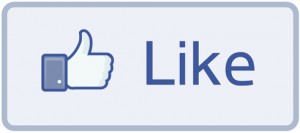
Related to the ongoing discussion about blogging and commenting: Lesley kindly shared the link to the little heart-button plug-in she uses at her Bower. Now, I know Facebook’s like button comes in for lots of ribbing, some of it earned. Many people have written about the superficiality of ‘like’ culture. Clicking a button to ‘like’ a cause is a far cry from actually participating in the cause. I get it. But the humble, mockable like button serves another purpose, a kind one, an actually meaningful one. It says: I’ve read this, I paused a moment in my busy day and took note of something you said, I appreciate your words, I’m grateful you shared this thought (or link) with me. It’s quite nice, really, how much companionable message can be conveyed by that quick click. “15 likes” can mean “15 smiles.”
I’ve been noticing this particularly on Twitter of late. For years, I all but ignored the “favorite” button there. I took it literally, understanding it to indicate a truly outstanding tweet, the sort that must by definition be rare. But somewhere in the past year, I realized people had begun using “favorite” as “like.” Quite often, it’s a way to let someone know you appreciated his or her comment even if you didn’t have anything to say in reply. I favorite quite liberally now, just as over on Facebook I like with abandon. And my appreciation is genuine. You’re saying interesting or amusing things, and I like them.
Anyway, I’ve added the like plug-in here, in case you’d like (heh) a way to say hello without leaving a comment. I haven’t yet decided how I want to label it (I’ve left it just ‘like’ for now). Lesley or Sarah, which one of you was it who had a “nodding quietly” button for a while? I liked that designation very much. I’d click a heart for it if I could, and mean it. 🙂
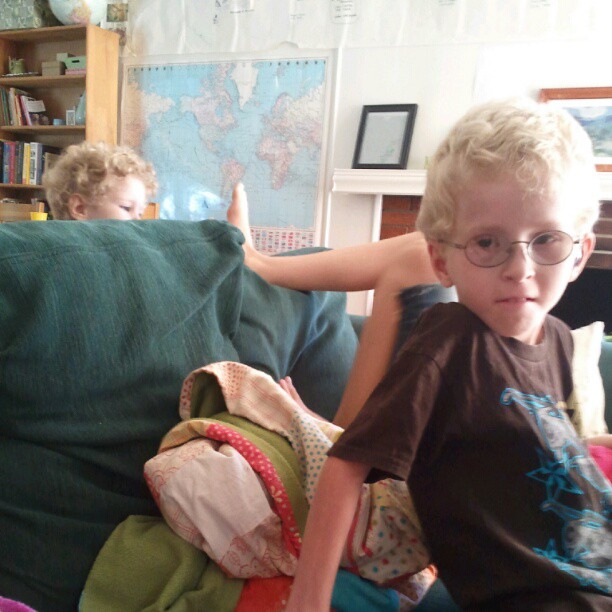
A thing I love to do, when I encounter a new blog I like, and sometimes with blogs I’ve been reading for years and years, is to go back to their very first posts and read all the way through the archives. Blogs are like memoirs, but rougher, less polished, wonderfully raw. It’s like poring over a photo album from the ’70s—our photos now may be cropped and filtered, beautifully lit, but our blogs reveal the messy business of life just beyond the frame. And I love that.
I love experiencing the development of a voice, reading along as day by day a writer grows more confident in her manner of expression, her point of view.
I love the conversations, the small-town feel of some comboxes, a warmth and familiarity that grows from people meeting up in the same place week after week.
I love watching how things change over time—the toddlers become teens, and the blogger’s interests and concerns shift direction; or there’s a move, a new job, an upheaval. Sometimes there is a tragedy, and I grieve invisibly for people I’ve never met, people I think of at odd moments because a bird or cloud or phrase reminds me of them.
That’s another piece of it, the associations. Reading a blog for a long stretch means you form connections between people and the things they love. The word ‘knitting’ brings specific people into my mind. Or: Quiet. Skipping. Selkie. Choir. Butter. Valentine. Crows. Homespun. Trillium.
Sometimes, the best times, there’s a reciprocity, and a blogger—or commenter—becomes not simply someone you read, but someone you know. A friend.
Since I seem to be writing a lot about iPod Touch apps and social media lately, here’s a roundup page for easy reference.
A day in the life of my iPod Touch (my favorite apps)
A couple more apps
First impressions of the Kindle
Streamlining the way I use social media
Social networks for book lovers
Facebook—why I love it; how I keep it streamlined
Facebook’s privacy settings
5 reasons I love Twitter
Tips for using Twitter (these last four are part of a series at Faith & Family Live; that last one is coming tomorrow)
And lest you think I spend all my time online (what mom of six could?)—I’ve written a few posts about books in my time, too. 😉
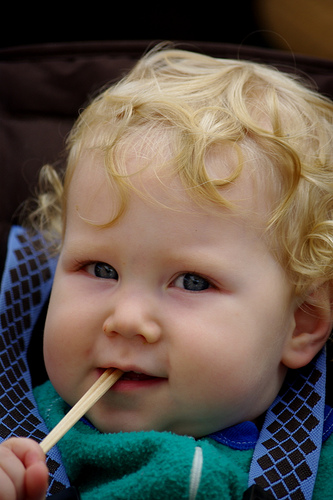
Who can stay online when there are cheeks like this to smooch?
February 13, 2010 @ 9:22 am | Filed under:
Links Like everyone else, I’m still trying to figure out the ins and outs of Buzz, but I made one discovery I wanted to tell other parents about ASAP—if your kid comments on one of your buzz posts, all your followers (as far as I can tell) can see that comment, even if they aren’t following your kid themselves. And it looks like you can only comment on buzz if you have made your Google profile public, so that means any other followers can click through to your child’s profile.
(Obviously this applies to any Buzz user, but I thought parents might be particularly concerned about their kids’ email privacy.)
If I’m understanding things correctly, you can follow people on Buzz (in Buzz? do we have grammar for this yet?) without making your Google Profile public. But in order to comment on (public) Buzz or write public Buzz yourself, you must make your Google Profile public. You may have done this automatically when you first clicked the Buzz link yesterday.
If I’ve got this wrong, please let me know and I’ll correct it. I tested it with Scott’s account—his Google Profile is private, and when I tried to comment on my account’s buzz from his account (you following this, LOL?), I got a pop-up saying he had to make his profile public in order to comment.
(Now, that was a PUBLIC buzz. Do you have to have a public profile to comment on a PRIVATE buzz?)
So okay, you know I love me my social media, but I love my kids’ email privacy even more. If your kids want to be able to Buzz, it might be a good idea to encourage minimalist profiles for them. Especially since, as I understand it, Buzz is going to be searchable via Google.
Oh, and in case you don’t know, you can turn Buzz off (and back on) by clicking a tiny link at the bottom of your gmail screen.
More to come as we continue to figure Buzz out. I do like the threaded conversations, but my first response to Buzz is that it’s too pushy. I love Twitter and Facebook, as you know, but I like having to make the extra effort to click there. My gmail inbox is already an overwhelming presence—I don’t know that I want MORE stuff in it. However, buzz can be filtered into folders like other gmail, so that can help cut down on inbox clutter at least.
UPDATED: In addition to having your kids keep their profiles either private (but then they can’t post or comment on public buzz) or very bare bones, with no personal info, you might also want to take a look at your own Google profile. The default setting publicly displays lists of everyone you follow, and everyone who follows you. And when you first activate buzz, these follower/followee lists are made up of 1) the people you follow/are followed by in Google Reader and 2) the email contacts you write most often. (!) So if you don’t want your Aunt Effie to know you’re g-chatting daily with her arch-enemy, your Aunt Prunella, you might want to uncheck those boxes.

(Or you could just ditch Buzz altogether. There is that.)
The other day I mentioned two book-related social media platforms I use: GoodReads (faithfully) for logging the books I’ve read, and LibraryThing (sporadically) for cataloging the books we own.
I’ve experimented with several other platforms—
• BookGlutton is growing on me. It’s an ebook reader for your browser, with some nifty features built in. You can write notes in the margins, and other people can see these notes and comment back—so just imagine, we could all read a book together and discuss it page by page if we wanted.
For example, if you click on that widget it’ll open to the first page of the book, and there’s a chat window (the TALK button on the left) and a place to write margin notes (the MARK button on the right). Has possibilities, no?
(I’m curious—did the widget add to this page’s download time?)
• BookBalloon—a forum for discussion about books and the arts. Every time I visit I wish I had more time to participate there. Very high caliber of conversation. There’s a monthly book club, author interviews, all sorts of good stuff.
• Readernaut—same concept as GoodReads, I think?
• Reading Trails—a place to create lists of related books, in that rabbit-traily way that appeals to so many of us.
And a few I’ve not yet explored:
• aNobii
• Shelfari (I see the Shelfari widget all over the place; it’s the one that looks like a real bookshelf.)
What have you tried? What’s your favorite way to talk about books online?













